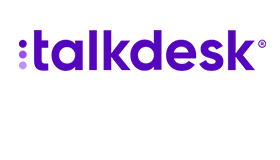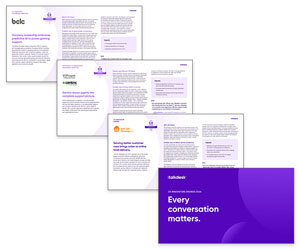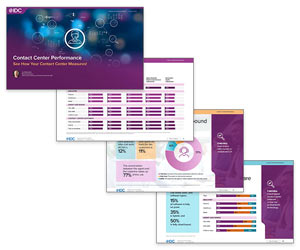Amanda Verner of Talkdesk shares a number of knowledge management ideas to leverage during a crisis.
Contact centres are one of the many industries feeling the impacts of the coronavirus (COVID-19), and right now, it’s anything but business as usual.
With short notice and a high sense of urgency, contact centres made major changes to how they operate, transitioning millions of agents to work remotely, adjusting their training program to onboard new employees from home and adapting to a massive increase in call volume.
In the absence of co-workers, mentors or managers nearby to guide employees, the need for simple and effective knowledge management has intensified.
In fact, according to APQC, 90% of organizations are either working on, or plan to leverage, their knowledge management team to help during the COVID-19 pandemic.
Below I share some of the major knowledge management needs and challenges across three industries, and what strategies they are using to adapt to their new environment and set their team up for success.
Utilities: Leveraging Knowledge Management for Remote Training
As an essential service, utility contact centres have stepped up to find new ways to support the millions of customers who now face financial uncertainty. This has driven the need for new billing and collections rules and increased staff training — all in a remote environment.
Trainers are challenged with teaching new policies and training on highly complex processes without the luxury of a classroom or nesting area.
Despite these challenges, there are many utilities who have quickly adapted to their new circumstances and are successfully training and cross-training staff with a few adjustments to how they teach and manage information. Below are three of the most commonly used techniques:
- Building emergency call-flows for staff that aren’t fully trained: The fast pace of change during COVID-19 often requires employees to begin working quickly without the usual 4+ weeks of training and onboarding. Creating customized call-flows helps get new employees up to speed faster and assist customers sooner.
- Using a knowledge management solution that enables learning by doing: Highly interactive training content keeps employees engaged and enables training that’s both faster and smarter. Allowing agents to practise executing different types of contact scenarios is one of the best ways to prepare them for customer interactions.
- Creating new documentation for cross-training and upskilling: Contact centres have urgently been upskilling staff to accommodate the major shift in incoming types of calls. Creating additional documentation enables agents to feel supported and confident in their abilities as they perform new tasks for the first time.
Finance: Quick Changes and Updates to Information
Finances are top of mind during these turbulent times, and organizations like banks, credit unions and insurance providers are experiencing a massive increase in call volumes from concerned customers who are struggling to make payments.
Fortunately, financial institutions around the world have implemented new policies and increased flexibility to help those in need.
Throughout COVID-19, knowledge management has played an essential role in not only keeping employees informed on important changes to information, but ensuring consistent messaging is relayed to customers.
The evolving needs have made these three knowledge management strategies essential to their success:
- Quickly creating, updating and deploying company knowledge: Many financial institutions have had to pivot as frequently as every week. This drives the need for quick updates to policies and procedures and a way to communicate them with employees.
- Building emergency scripting for non-standard messaging: To complement the new policies and procedures in place, it’s important that employees have the right messaging when speaking to customers. This temporary emergency scripting will help guide employees through many different types of contact scenarios they’ll encounter during COVID-19, or other crisis scenarios in the future.
- Notifying employees when important changes are made: Deploying quick changes to information is only valuable if employees are aware and using them. A notification system ensures employees always have the most up-to-date information.
Government, Cities and 311 Centres: Information That’s Easy to Access and Navigate
Citizens are relying on both federal and local governments for new information as circumstances change.
Concerned citizens are contacting their local government or 311 centre with questions ranging from what public facilities are open, to COVID-19 relief information, testing locations and much more.
Considering that restrictions in certain areas can change on a daily basis, it’s mission critical that employees are giving accurate information to citizens.
Given the urgency, the pace of change and the high level of importance of these communications, governments and 311 centres have leaned heavily on knowledge management, especially by:
- Ensuring that shared knowledge is easy to follow: In order for employees to fully comprehend information and give quick answers to citizens, information should be simple to understand. This can help decrease the need for assistance from supervisors and escalations.
- Making knowledge easy to find and access from a remote location: With everyone working remotely, there are no colleagues to ask questions of, and no supervisors walking the floor. Having information that’s easy to access is imperative for equipping employees with everything they need to succeed.
Support Your Team With the Right Knowledge Management Strategies
Employees are relying on knowledge management now more than ever for consistent information and guidance.
Give them the support they need with these strategies and the right knowledge management solution.
Learn seven different ways you can leverage knowledge management in a crisis as well as best practices you can start using right away by downloading ProcedureFlow’s new ebook.
This blog post has been re-published by kind permission of Talkdesk – View the Original Article
For more information about Talkdesk - visit the Talkdesk Website
Call Centre Helper is not responsible for the content of these guest blog posts. The opinions expressed in this article are those of the author, and do not necessarily reflect those of Call Centre Helper.
Author: Talkdesk
Published On: 19th Jun 2020 - Last modified: 23rd Jun 2020
Read more about - Guest Blogs, ProcedureFlow, Talkdesk






 Talkdesk is a global customer experience leader for customer-obsessed companies. Our contact center solution provides a better way for businesses and customers to engage with one another.
Talkdesk is a global customer experience leader for customer-obsessed companies. Our contact center solution provides a better way for businesses and customers to engage with one another. 












